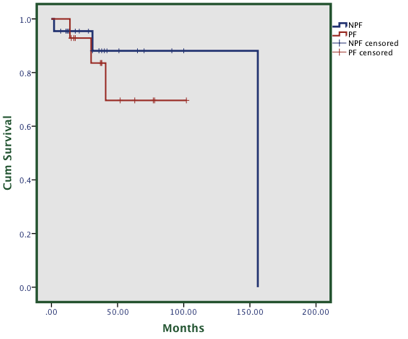Background/Purpose:
Pulmonary fibrosis (PF) occurs in up to 30% of patients with microscopic polyangiitis (MPA). Data suggest PF implies a higher mortality. We examined the survival of our MPA patients according to the presence or absence of PF.
Methods:
Retrospective analysis of all MPA patients present in a single respiratory referral centre from 2003-present. All patients were defined according to the CHCC 2012 Nomenclature. Univariate analysis was used to establish proportions with means ± SD and medians calculated; bivariate analysis was used to compare groups, Student’s t test for continuous variables and X2 test with Yates correction for categorical variables. Kaplan-Meier analysis was done for survival. Significance was established when p<0.05.
Results:
From 37 MPA patients (35 MPO-ANCA positive, 2 PR3-ANCA positive), the majority were females (67.5%); 15/37 (40.5%) had PF with equal gender distribution. Women were predominant in those without PF (77.2%, p<0.05). PF antedated other disease manifestations for more than a year in 14/15 PF patients. One developed it concurrently. The median survival of the group was 37 months (2-156). Myalgias were more frequent in those with PF (53.3% vs 18.2%), while hematuria (33.3 vs 56.5%), acute respiratory failure (6.7% vs. 36.7%) and lymphopenia (0 vs. 22.7%) were less frequent (all significant). Lung hemorrhage was more frequent in those without PF (68.2% vs 33.3%, p=0.08). No other significant differences in clinical or paraclinical variables were seen, being similar at disease onset in both groups. There were 6 deaths, 5 with and 1 without PF; 1 lost to follow-up patient without PF was censored as death for survival analysis. By 41 months, there is a trend for a better cumulative survival in patients without PF (88 vs 70%) (graph), irrespective of PF being present at onset or during disease evolution.
Conclusion:
While we acknowledge the limitations of this study (sample size, need of longer follow-up), it suggests that patients with MPA and PF have a worst outcome than those without PF, even when patients without PF presented with more severe manifestations (respiratory failure, lung hemorrhage, renal symptoms). Interestingly the majority of these patients had PF antedating other MPA manifestations, probably due to referral bias. The influence of this mode of presentation and other factors in outcome is subject to further evaluation.
Disclosure:
L. M. Saldarriaga Rivera,
None;
N. Ruiz,
None;
L. F. Flores-Suarez,
None.
« Back to 2014 ACR/ARHP Annual Meeting
ACR Meeting Abstracts - https://acrabstracts.org/abstract/survival-of-microscopic-polyangiitis-mpa-patients-with-and-without-pulmonary-fibrosis-pf/

